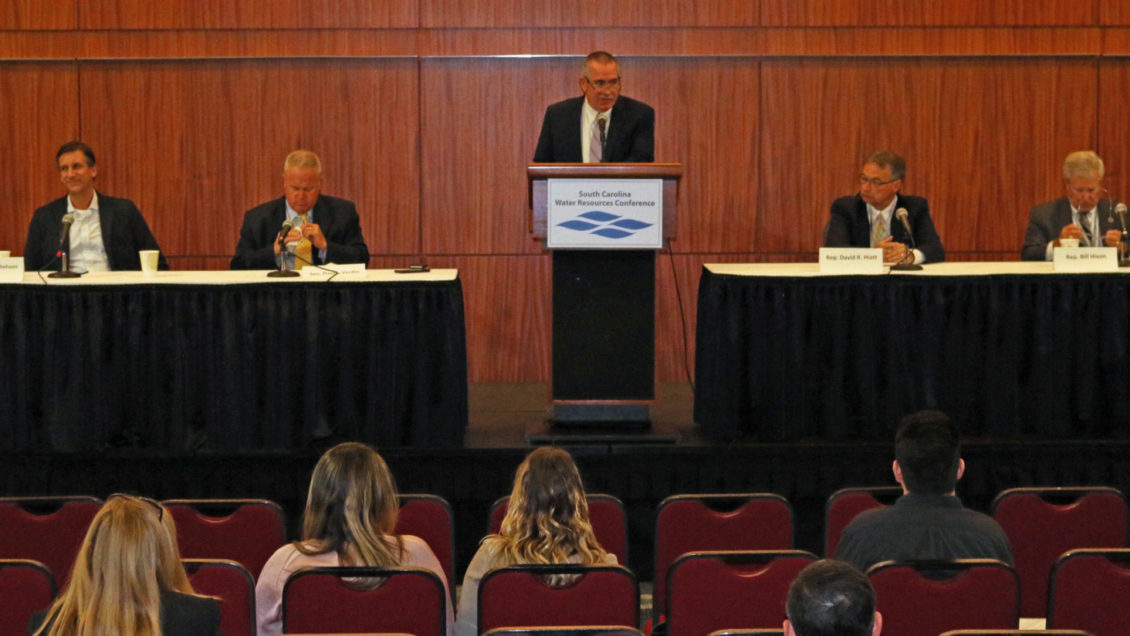COLUMBIA — South Carolina lawmakers stressed to a gathering of water experts Thursday the importance of continuing to develop better understanding of the state’s water resources to meet the demands of a growing population and manage the impact of increasingly frequent extreme weather events.

State Sen. Vincent Sheheen, Kershaw County; Sen. Danny Verdin, Laurens; Rep. Davey Hiott, Pickens; and Rep. Bill Hixon, Aiken, sat on the legislative panel Thursday at the 2018 South Carolina Water Resources Conference, sponsored by Clemson Public Service and Agriculture.
“We should want information in this state,” Sheheen said. “We’re getting too crowded with too many people to not understand that we’re stressing our resources, and to accurately measure (our water) and understand what we have, we’re going to need to collect data — and that costs money. … What we don’t want to do is use up the resource in ignorance and then wonder why we didn’t do something. I’m hopeful that we can all work together to get good, accurate, scientific studies done. I believe in science and I believe in good information, and then I believe in prudent regulation where it’s needed.”
Jeff Allen, director of the South Carolina Water Resources Center at Clemson University, thanked the members of the General Assembly for their support of water planning, dam safety programs and water research and education programs in recent years.
“As you well know, the asking will probably never end because the problems never end and the solutions that we seek are ongoing,” Allen said.
Verdin said the expertise of the water experts at the conference is crucial to lawmakers in making the decisions that influence the stewardship of the state’s water resources.
“There’s nothing more valuable to us as legislators than to be with a group such as yourselves of professionals that are invested in a particular field,” he said. “I was here several years ago, and I remember that the most beneficial aspect of what transpired was what we heard from you rather than what we pontificated about.”
Sheheen, whose Senate district encompasses Lancaster, Chesterfield and Kershaw counties, discussed the importance of water research to lend unbiased, science-based knowledge to deal with the rise of extreme weather events, such as the recent flooding in his district caused by Hurricane Florence.
“We need to particularly focus on our rural counties. How do we respond for our counties that don’t have big mobilizations that they can handle?” he said. “This was a water issue. It was not a wind issue or a tree issue. It was water, water everywhere and not a drop to drink. It was everything from sewage to hazardous waste … it’s a real problem. We had over 100 houses that were contaminated. I hope you will help us get our minds around what we should be doing to deal with this increasingly common phenomenon of having a 100-year flood every two years.”
Sheheen also broached the subject of the growing divide between South Carolina’s urban and rural areas and how to manage the specific water needs.
“I represent an area where there are many, many dams — from old farm ponds to recreation — and as we understand that with the flooding events we’re having those are increasing risks. How do we balance that with somebody who’s owned a dam and a pond for 75 years that was in the middle of the country and then somebody builds a housing development below it? How do we deal with that?” he said.
Hiott also remarked on the need for further research to understand the “happy medium” on how to deal with droughts and floods.
“Every year I’ve been on the House Agriculture Committee, somewhere along the line we’ve dealt with water issues — whether we’ve had a drought issue where we haven’t had enough, or whether we have too much with all the hurricanes and flooding that we’ve had recently. … We can’t legislate on a drought issue, we can’t legislate on a flood issue, we’ve got to legislate in the middle somewhere,” he said.

Hixon said that as a representative of an area that borders another state — Georgia — it is important for scientific researchers to develop more understanding of South Carolina’s water resources to provide the information for lawmakers to handle interstate water issues.
“Water is very important to us, and we’re here to learn to see what we can do to try to make everybody happy,” he said.
During the session, Powdersville Water Executive Director Dyke Spencer stressed the need for the state to continue to invest in the state’s water resources personnel due to the graying of the industry’s experts.
“This is probably one of the best opportunities that we’ve had in history to look out for the water resources of this state,” Spencer said. “With the growth that we’re looking at in parts of the state right now, that’s even bringing more urgency to it. I thank y’all for what you do and just ask for your support in the future. There are a lot of hard questions to answer in the future.”
Allen noted that one of the purposes of the Water Resources Conference is to ensure the knowledge and expertise of the state’s water experts is passed on to a younger generation that will continue to shepherd South Carolina’s water resources.
“At this conference, we always have a cadre of graduate students from all the research universities in South Carolina,” he said. “We also do have a group of high school students here from Edisto High School with their Next Gen Magnet School program, and they are a fantastic group who have been very engaged in the conference. And something we plan to do with the water conference every year is offer a scholarship to a high school group to come and participate.”
Get in touch and we will connect you with the author or another expert.
Or email us at news@clemson.edu

